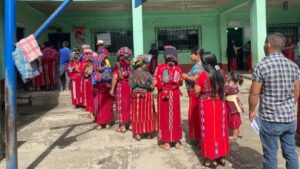No one expected it, but in Guatemala, the left-wing presidential candidate Arevalo has surprisingly made it to the runoff. His announced fight against corruption resonated with voters, especially in rural areas, where women and men in traditional dress waited in line to vote.
Some smaller towns even closed streets for political parties to hold their election parties, and celebrations were lively.
 In Chajul, a city located approximately 200 kilometers northeast of Guatemala’s capital, people stood in long queues to cast their votes in the national elections. Aside from the new head of state, voters also had the opportunity to elect representatives and mayors.
In Chajul, a city located approximately 200 kilometers northeast of Guatemala’s capital, people stood in long queues to cast their votes in the national elections. Aside from the new head of state, voters also had the opportunity to elect representatives and mayors.
The center-left party Movimiento Semilla had something to celebrate: their presidential candidate Bernardo Arevalo achieved second place with around twelve percent. “I thank the people who believed in us,” he said. “This is a great opportunity for us. People have sent a clear message: a rejection of corruption.” The Guatemalans expected profound change, according to Arevalo.
The result likely surprised everyone because pre-election polls had not predicted it.
Significant Loss for Torres
Most votes went to former first lady Sandra Torres of the UNE party, who is running for the third time. She had already been leading in the polls but lost significantly in votes, obtaining 15 percent.
“Previous governments were all men. They failed,” Torres said. “I, as a woman, will support you, and I will deliver results. I have experience—I know what I am doing.” The people would know her and “know that I keep my promises.”
Because neither candidate reached the necessary 50 percent, there will be a runoff between Arevalo and Torres.
Arevalo, the center-left politician and son of the country’s first democratically elected president, Juan Jose Arevalo, has made the fight against corruption his top priority. The social democrat Torres represents the old structures.
Human rights groups, political scientists, and indigenous representatives criticize the increasing control of the country’s institutions by special interest groups from politics and the financial sector.
Low Voter Turnout
There is talk of a “corrupt pact” consisting of organized crime, politicians, influential businessmen, and the military. Beforehand, three candidates were excluded, including the indigenous Thelma Cabrera of the left-wing movement MLP, under dubious reasons.
Voter turnout was low, at around 60 percent, with almost a quarter of voters casting an invalid or blank ballot – surely a form of protest. Francisco Rocael Mateo Morales of the Maya People’s Council sees Arevalo’s unexpected success as good news.
“Arevalo promises to fight this cancer of corruption that has spread throughout the country,” Morales said. “He is a democrat. He talked a lot about how to restore the rule of law.”
The runoff between Arevalo and Torres is expected to take place in August.

